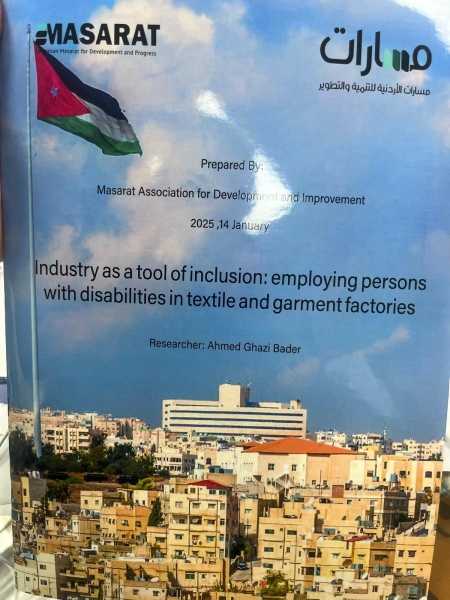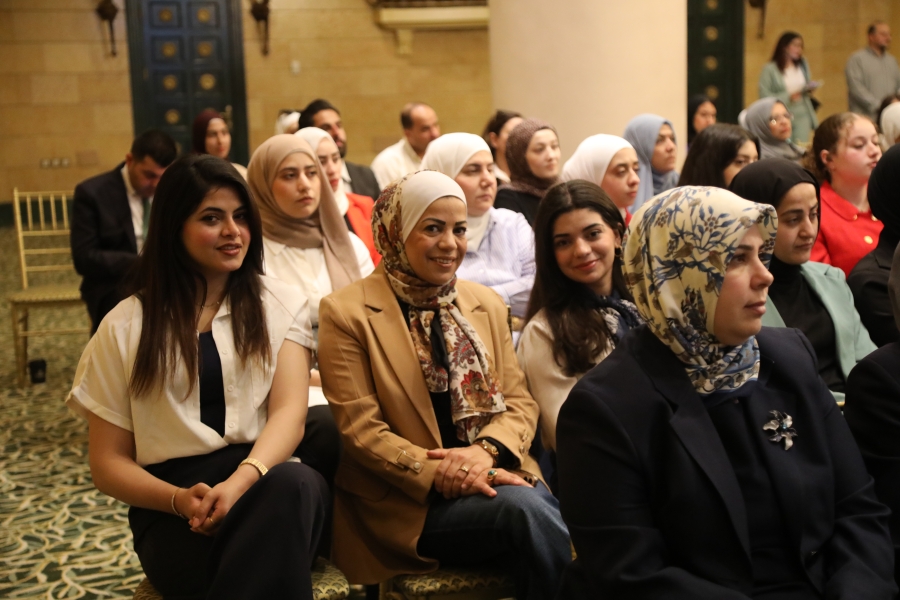Masarat Launches a Study Titled “Industry as a Means of Inclusion: Employment of Persons with Disabilities in Textile and Garment Factories” Under the Patronage of His Excellency Minister of Labor Dr. Khaled Al-Bakri.

Under the patronage of Minister of Labor Dr. Khaled Al-Bakri, the Jordanian Masarat Foundation for Development and Progress launched a study on Wednesday titled “Industry as a Means of Inclusion: Employment of Persons with Disabilities in Textile and Garment Factories.”
Minister Al-Bakri, in the presence of Senator Asya Yaghi and the Commissioner-General for Human Rights Jamal Al-Shamayleh, stated: “At the Ministry of Labor, we believe in adopting a scientific approach to diagnosing the realities of any sector, provided that any study conducted is based on accurate scientific foundations.” He emphasized the ministry’s willingness to support and benefit from scientific studies that identify challenges and propose solutions for improving labor conditions.
He highlighted that, to ensure a safe working environment for employees in the textile and garment sector, the ministry established the “Better Work” department in 2020 in cooperation with the International Labour Organization (ILO).
Minister Al-Bakri explained that the “Better Work” department aims to improve working conditions and enhance business competitiveness in the ready-made garment sector. This department monitors labor complaints, conducts inspections in the sector, coordinates awareness campaigns for workers and employers with relevant ministry directorates, and works to improve labor standards and company performance. Additionally, it provides advisory and training services while strengthening the capacities of the workers’ union in this sector.
He also pointed out that through the electronic platform “Himaya” (Protection), the ministry provides clear mechanisms for filing labor complaints across all sectors. The platform contains detailed data categorizing complaints and outlining resolution mechanisms.
Meanwhile, Talal Ghoneimat, Executive Director of the Jordanian Masarat Foundation for Development and Progress, stated that integrating persons with disabilities into Jordan’s labor market is not merely a legal obligation but a national, social, and ethical responsibility. He emphasized that sustainable development cannot be achieved without ensuring the participation of all segments of society, including persons with disabilities, on an equal footing with others.
Ghoneimat added that employing and integrating persons with disabilities into the labor market has become a priority both locally and internationally due to its importance in achieving social justice, promoting economic development, and utilizing the potential of this important group. Despite recent progress, persons with disabilities still face significant challenges that hinder their access to decent job opportunities and prevent them from realizing their full potential.
He stressed that this study, conducted by the Jordanian Masarat Foundation for Development and Progress, aims to highlight the realities of employing persons with disabilities in Jordan’s textile and garment factories, the challenges they face, and the availability of suitable working environments for them.
Ghoneimat emphasized the importance of employers committing to creating inclusive work environments, implementing laws that protect the rights of persons with disabilities, and raising societal awareness about their capabilities and contributions to the national economy.
Study Recommendations:
The study recommended developing vocational training programs tailored to persons with disabilities to align with labor market needs and equipping them with the necessary skills. It also emphasized the right of persons with disabilities to participate in society and called for workplaces to accommodate their needs by providing necessary facilities.
Key recommendations include implementing occupational health and safety strategies to ensure an inclusive work environment, adhering to the accessibility requirements outlined in the Building Code for Persons with Disabilities, and removing physical barriers that limit their rights and freedoms.
The study also stressed the need for awareness workshops for employees and workers who interact with persons with disabilities, including training on reasonable accommodations and disability-inclusive policies. This training could be specifically focused on disability issues or be part of broader diversity and inclusion training. It also called for combating the prevailing charity-based perception of hiring persons with disabilities.
Among the study's recommendations was the need to provide sign language interpreters in factories to foster an inclusive environment for deaf and hard-of-hearing workers, ensuring the organization and provision of sign language services in these workplaces.
Additionally, the study recommended improving the physical environment of textile and garment factories by providing appropriate pathways and ramps for people with mobility impairments, ensuring easy access to different factory facilities, and equipping restrooms and other amenities to meet the needs of people with mobility and visual impairments. It also suggested installing visual and auditory assistive tools (such as sound and visual signs) to support workers with hearing and visual disabilities.
Furthermore, the study emphasized the importance of implementing employment policies that support the integration of persons with disabilities in the workforce, including adopting flexible work schedules that accommodate their needs and providing legal guarantees to protect their rights, such as ensuring a safe work environment.
Following the study’s launch, a series of discussion sessions were held, featuring representatives from the Ministries of Labor and Social Development, the Higher Council for the Rights of Persons with Disabilities, the Vocational Training Corporation, and the International Labour Organization (ILO).
We have developed a long-term strategy to enhance the role of textile and garment factories in employing and integrating persons with disabilities by increasing their employment rate in alignment with national legislation and international standards, thereby promoting equal job opportunities. The strategy focuses on developing an inclusive and accessible work environment through infrastructure improvements and technological and design modifications to accommodate various disabilities. It also aims to raise awareness among management and employees about the importance of disability inclusion as a valuable asset, reinforced through regular training sessions to foster an inclusive workplace culture. Additionally, the strategy emphasizes building strong partnerships between factories, government entities, and civil society organizations to support the employment of persons with disabilities and ensure its long-term sustainability.




